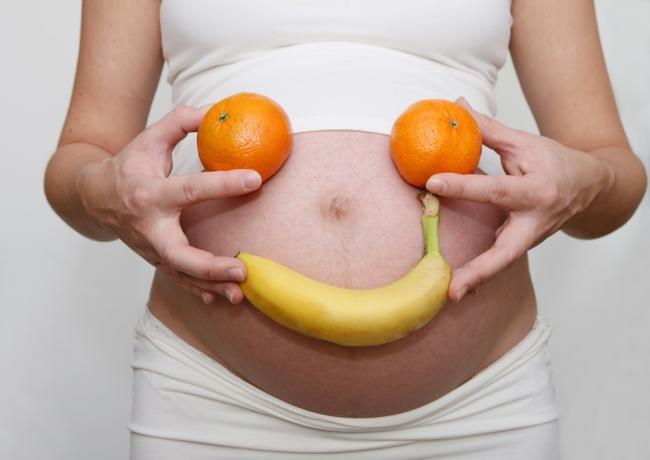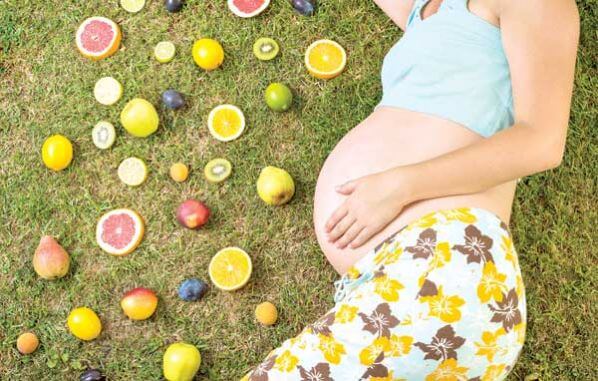Vitamin C During Pregnancy: How Much Is Necessary

Pregnancy is one of the most physically demanding stages for women. Therefore, special attention should be paid when it comes to following a healthy diet and ensuring your daily intake of micronutrients such as vitamin C, as these are essential for the proper development of the baby.
Experts even recommend increasing the intake of certain vitamins such as folic acid in the months prior to conception, as this helps to avoid problems such as malformations in the neural tube of the fetus. Vitamin C is one of the 13 essential nutrients during pregnancy, as it provides protection against several diseases and birth defects. What’s more, it boosts immunity and also protects against anemia by helping the body absorb iron. So, learn how much is needed.
The World Health Organization‘s recommendations on energy intake for a pregnant mother are that it should be increased by 300 kilocalories per day in early pregnancy. This translates into a diet that can vary between 2,150 and 2,200 kilocalories per day. In turn, the increase in the consumption of calories should be higher in the second and third trimesters.

The daily consumption of fruits and vegetables is one of the key tools to maintaining a balanced diet full of vitamins such as vitamin C. You can’t leave out the intake of foods such as nuts, legumes, meats, and fish in order to ensure an adequate balanced protein intake.
Consume foods that are rich in vitamin C
Natural orange juice is a high source of folic acid which, combined with vitamins B-12, makes it possible for the pregnant mother’s body to better digest proteins and produce new ones.
This is why the internal system of pregnant women is maintained with a good level of vitamins when she drinks a glass of orange juice on a daily basis. Vitamin C intake during pregnancy is considered safe at recommended doses between 80 mg and 85 mg for pregnant women 19 years of age and older.
For proper daily iron absorption, vitamin C comes into play as a fundamental part of this process. Increased consumption of foods that are high in this vitamin should be part of the daily diet of every pregnant woman. A glass of orange juice provides 60 mg of vitamin C, 65% of the recommended daily intake.
But you should know that there are other foods that are even richer in this nutrient than orange juice, such as the following:
- Citrus fruits: Such as orange, lemon, grapefruit
- Other fruits: Such as kiwis, strawberries, melon, black currant, papaya
- Vegetables: Red bell pepper, brussels sprouts, broccoli, and also parsley
Another interesting fact for women concerned about stretch marks during pregnancy is the ability of ascorbic acid to build collagen. Collagen provides elasticity to stretched skin tissues as your belly grows during pregnancy.
On the other hand, it is very important to keep an eye on this vitamin, as pregnant women who do not receive the recommended amount of ascorbic acid have an increased risk of developing preeclampsia, a condition that causes elevated blood pressure. Vitamin C deficiency has also been linked to increased oxidative stress and impaired implantation according to a study in the journal Nutrients.

A good diet is key during pregnancy
Low vitamin C levels are also associated with HELLP syndrome, a disorder in which pregnant women suffer from increased liver enzymes, low platelet counts, and red blood cell breakdown. All of these pose a danger to the mother and baby.
Some mothers use multivitamin supplements that contain high amounts of this vitamin. These multivitamins aren’t considered safe during pregnancy, as they contain too much vitamin C. The best vitamin C supplement during pregnancy is one that’s specifically designed for pregnant women and contains just the right amount of vitamins.
The best choice for pregnant women is to eat a variety of fruits and vegetables and make sure you’re eating at least one vitamin C-rich food every day, such as orange juice, kiwi, red bell pepper, or strawberries.
Also, pregnant women at risk for high blood pressure should use caution when consuming ascorbic acid. It’s best to consult a physician about your daily diet to determine whether additional ascorbic acid is needed to fill nutritional gaps during pregnancy or whether the normal intake is sufficient.
After delivery, nursing mothers need 115-120 mg of vitamin C per day. Ascorbic acid is excreted in human breast milk and the effects on the infant are unknown. Therefore, caution is advised against excessive supplemental intake of vitamin C in breastfeeding women.
Pregnancy is one of the most physically demanding stages for women. Therefore, special attention should be paid when it comes to following a healthy diet and ensuring your daily intake of micronutrients such as vitamin C, as these are essential for the proper development of the baby.
Experts even recommend increasing the intake of certain vitamins such as folic acid in the months prior to conception, as this helps to avoid problems such as malformations in the neural tube of the fetus. Vitamin C is one of the 13 essential nutrients during pregnancy, as it provides protection against several diseases and birth defects. What’s more, it boosts immunity and also protects against anemia by helping the body absorb iron. So, learn how much is needed.
The World Health Organization‘s recommendations on energy intake for a pregnant mother are that it should be increased by 300 kilocalories per day in early pregnancy. This translates into a diet that can vary between 2,150 and 2,200 kilocalories per day. In turn, the increase in the consumption of calories should be higher in the second and third trimesters.

The daily consumption of fruits and vegetables is one of the key tools to maintaining a balanced diet full of vitamins such as vitamin C. You can’t leave out the intake of foods such as nuts, legumes, meats, and fish in order to ensure an adequate balanced protein intake.
Consume foods that are rich in vitamin C
Natural orange juice is a high source of folic acid which, combined with vitamins B-12, makes it possible for the pregnant mother’s body to better digest proteins and produce new ones.
This is why the internal system of pregnant women is maintained with a good level of vitamins when she drinks a glass of orange juice on a daily basis. Vitamin C intake during pregnancy is considered safe at recommended doses between 80 mg and 85 mg for pregnant women 19 years of age and older.
For proper daily iron absorption, vitamin C comes into play as a fundamental part of this process. Increased consumption of foods that are high in this vitamin should be part of the daily diet of every pregnant woman. A glass of orange juice provides 60 mg of vitamin C, 65% of the recommended daily intake.
But you should know that there are other foods that are even richer in this nutrient than orange juice, such as the following:
- Citrus fruits: Such as orange, lemon, grapefruit
- Other fruits: Such as kiwis, strawberries, melon, black currant, papaya
- Vegetables: Red bell pepper, brussels sprouts, broccoli, and also parsley
Another interesting fact for women concerned about stretch marks during pregnancy is the ability of ascorbic acid to build collagen. Collagen provides elasticity to stretched skin tissues as your belly grows during pregnancy.
On the other hand, it is very important to keep an eye on this vitamin, as pregnant women who do not receive the recommended amount of ascorbic acid have an increased risk of developing preeclampsia, a condition that causes elevated blood pressure. Vitamin C deficiency has also been linked to increased oxidative stress and impaired implantation according to a study in the journal Nutrients.

A good diet is key during pregnancy
Low vitamin C levels are also associated with HELLP syndrome, a disorder in which pregnant women suffer from increased liver enzymes, low platelet counts, and red blood cell breakdown. All of these pose a danger to the mother and baby.
Some mothers use multivitamin supplements that contain high amounts of this vitamin. These multivitamins aren’t considered safe during pregnancy, as they contain too much vitamin C. The best vitamin C supplement during pregnancy is one that’s specifically designed for pregnant women and contains just the right amount of vitamins.
The best choice for pregnant women is to eat a variety of fruits and vegetables and make sure you’re eating at least one vitamin C-rich food every day, such as orange juice, kiwi, red bell pepper, or strawberries.
Also, pregnant women at risk for high blood pressure should use caution when consuming ascorbic acid. It’s best to consult a physician about your daily diet to determine whether additional ascorbic acid is needed to fill nutritional gaps during pregnancy or whether the normal intake is sufficient.
After delivery, nursing mothers need 115-120 mg of vitamin C per day. Ascorbic acid is excreted in human breast milk and the effects on the infant are unknown. Therefore, caution is advised against excessive supplemental intake of vitamin C in breastfeeding women.
All cited sources were thoroughly reviewed by our team to ensure their quality, reliability, currency, and validity. The bibliography of this article was considered reliable and of academic or scientific accuracy.
- National Institutes of Health. Office of dietary suplements.
- Dror, D. K., & Allen, L. H. (2012). Interventions with vitamins B6, B12 and C in pregnancy. Paediatric and perinatal epidemiology, 26 Suppl 1, 55–74. doi:10.1111/j.1365-3016.2012.01277.x
- Wallace, K., Harris, S., Addison, A., & Bean, C. (2018). HELLP Syndrome: Pathophysiology and Current Therapies. Current pharmaceutical biotechnology, 19(10), 816–826. doi:10.2174/1389201019666180712115215
This text is provided for informational purposes only and does not replace consultation with a professional. If in doubt, consult your specialist.








